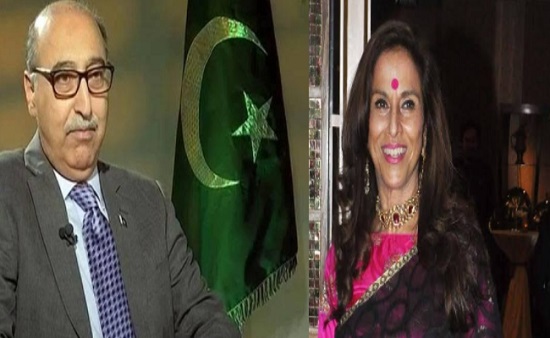
In an environment that thrives on sensationalism, former Pakistan High Commissioner to India Abdul Basit’s claim that he got Shoba De to write “an article in the newspaper for Kashmiris’ right to self-determination,” has set the Indian media abuzz. He was referring to a piece written by her in July 2016, titled ‘Burhan Wani is dead but he’ll live on till we find out what Kashmir really wants’ when Kashmir Valley was in the throes of a mass unrest triggered by Hizbul Mujahideen commander Burhan Wani’s death in an encounter with security forces.
Coming at a time when abrogation of Articles 370 and 35A along with bifurcation of J&K into two Union Territories is the prime topic for discussion, Basit’s revelation could not have been better timed as it has generated a debate on whether Ms. Shobha De wrote this article, of her own volition or at Basit’s behest. Since the article in question does advocate an anti-establishment viewpoint on the Kashmir issue, many are convinced that Basit is telling the truth, but there are also an equal number of people who feel that she’s just being framed.
In a bid to prove themselves right, both those who are demanding her head as well as the one’s going all-out to defend Ms. Shobha De’s professional integrity are busy fighting each other. While there’s nothing wrong in doing so, but in the ensuing cacophony, we are losing sight of the larger picture. Even though it’s important to clear the air on what was Ms. Shobha De’s motivation behind the particular article that she wrote, but this by itself isn’t the sole matter of prime concern. But Basit’s own admission of having got an Indian journalist to write an article that furthered Islamabad’s interests, is something that cannot be swept under the carpet.
There is nothing new in diplomats using local assets to further their national interests. Four centuries ago, British politician Sir Henry Wotton (1568- 1639) said as-much by stating that “An ambassador is an honest gentleman sent to lie abroad for the good of his country.” However, even though it may be rampant, but such skulduggery as Basit has himself admitted to hasn’t been accorded diplomatic licence since it’s most commonly used to impregnate the peoples’ mind with anti-establishment thoughts and amounts to subversion of sorts.
Therefore, New Delhi needs to step-in immediately and demand an explanation from Islamabad for Basit’s self-confessed indiscretion since it must certainly be having sanction of the government of Pakistan. This revelation has also given New Delhi undeniable proof that Islamabad is misusing its diplomatic facilities to arouse passions and incite unrest. It also needs to be remembered that Basit is the same person who by disregarding an advisory by New Delhi that his meeting with Hurriyat leaders would jeopardise Indo-Pak talks, precipitated a crisis that heralded an end to bilateral engagement between the two countries.
Basit’s revelation could well be a tip of the iceberg and the possibility of Pakistan having infiltrated into other domestic pressure groups cannot be ruled out. Therefore, it’s but natural for one to view attempts by some to portray abrogation of Articles 370 and 35A as well as restructuring J&K as a communally inspired act with suspicion. Similarly, when claims of widespread unrest against this move and deaths of protesters as a result of firing by police in Kashmir Valley are being made without any physical verification, would it be unfair if one was to dismiss this as motived communication?
The media too needs to take a serious note of such attempts being made by Pakistan to further its vested interests. Freedom of expression is the hallmark of any vibrant democracy. Yet, due prudence should be exercised by the media fraternity to prevent its members from being lured into championing a detrimental cause either by falling prey to material inducements or through emotional exploitation. No laws, rules, directives or guidelines can be invoked on this issue and as such it’s only the media that can shoulder the onerous task of ensuring that inimical forces don’t succeed in turning the fourth estate in India into a colony of fifth columnists.
